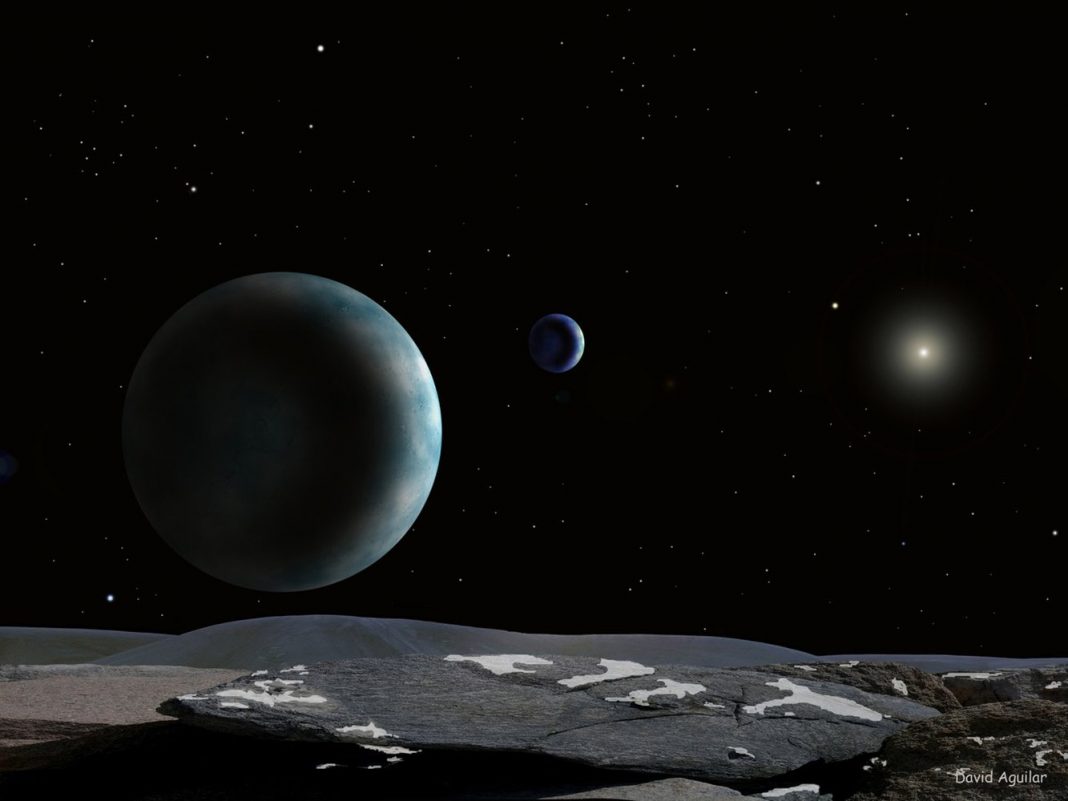Artist’s impression of Pluto and Charon as seen from among Pluto’s other moons.
Credit: David Aguilar/Center for Astrophysics
Sing along if you understand the words: When the moon strikes your eye, like a huge pizza pie, that’s a world!
That’s exactly what ancient Greek stargazers believed, anyhow. And inning accordance with a group of astronomers composing in the February 2019 problem of the journal Icarus, possibly it’s time we began considering Earth’s dependable satellite– plus benched dwarf worlds like Pluto and Ceres— as a full-fledged worlds when again.
That may sound odd, however it’s well within the agreement developed by centuries of clinical literature, the brand-new research study argues. The authors of that research study searched more than 200 years of clinical research study to attempt to respond to 2 basic concerns: Exactly what makes a world, inning accordance with the clinical neighborhood; and does that meaning fall in line with the requirements that the International Astronomical Union (IAU) utilized in 2006 when they notoriously removed Pluto of its planethood? [Top 10 Amazing Moon Facts]
The IAU’s judgment on Pluto (and for that reason all heavenly bodies looking for planethood) does not promote the clinical neighborhood, the authors identified.
” There are 120 examples I discovered of researchers in the current released literature breaching the IAU meaning, calling something a world although the IAU meaning states it’s not a world,” lead research study author Philip Metzger, a planetary researcher at the University of Central Florida, informed NBCNews.com “The factor planetary researchers do this is due to the fact that the IAU meaning is not beneficial for science.”
Exactly what makes a world?
After 76 years of book world status, Pluto was benched to a dwarf world in 2006 when the IAU voted that the icy orb cannot satisfy a set of requirements developed by years of clinical literature.
To be a world, they stated, Pluto needs to: 1) Orbit the sun; 2) Be huge adequate to it pull itself into a sphere shape under its own gravity; 3) “ Clear its area” of particles and other heavenly bodies, showing it has gravitational supremacy in its corner of the planetary system.
Pluto stops working that 3rd requirements. Due to the fact that it orbits in the Kuiper belt— an enormous ring of asteroids and planetoids that extends beyond the orbit of Neptune– Pluto is surrounded by countless other heavenly bodies and hunks of particles, each applying its own gravity. Pluto, then, is not the gravitationally dominant item in its area– and for that reason, the IAU stated, not a full-fledged world.
Inning accordance with Metzger and his coworkers, nevertheless, that 3rd little bit of the requirements is needlessly narrow– and not shown in the agreement of previous research study. After taking a look at numerous released astronomy documents returning to the 1800 s, the scientists discovered that, while a lot of authors concurred that worlds ought to be round and orbit the sun, the “clearing the area” guideline appeared just in a single 1801 paper.
The scientists concluded that this Pluto-excluding guideline is “approximate and not based upon historic precedent,” and ought to be for that reason neglected when specifying any present or future planet-sizedobjects in our universe.
” When Galileo explained the moons of Jupiter, he explained them as worlds,” research study co-author Kirby Runyon, a planetary geologist at the Johns Hopkins University Applied Physics Lab, informed NBCNews.com. “So, the real historic precedent is to think about round worlds that orbit other worlds as worlds, too. And we think about dwarf worlds to be full-fledged worlds.”
By this modified requirements Pluto is a world. So is Earth’s moon, and the moons of Jupiter and Saturn. That’s a questionable view that has currently gathered some astro-criticism— and the research study authors are great with that. If anybody disagrees with their evaluation, the scientists composed, it needs to depend on the agreement of clinical literature to alter it, not a vote by a single authority like the IAU.
Initially released on Live Science







